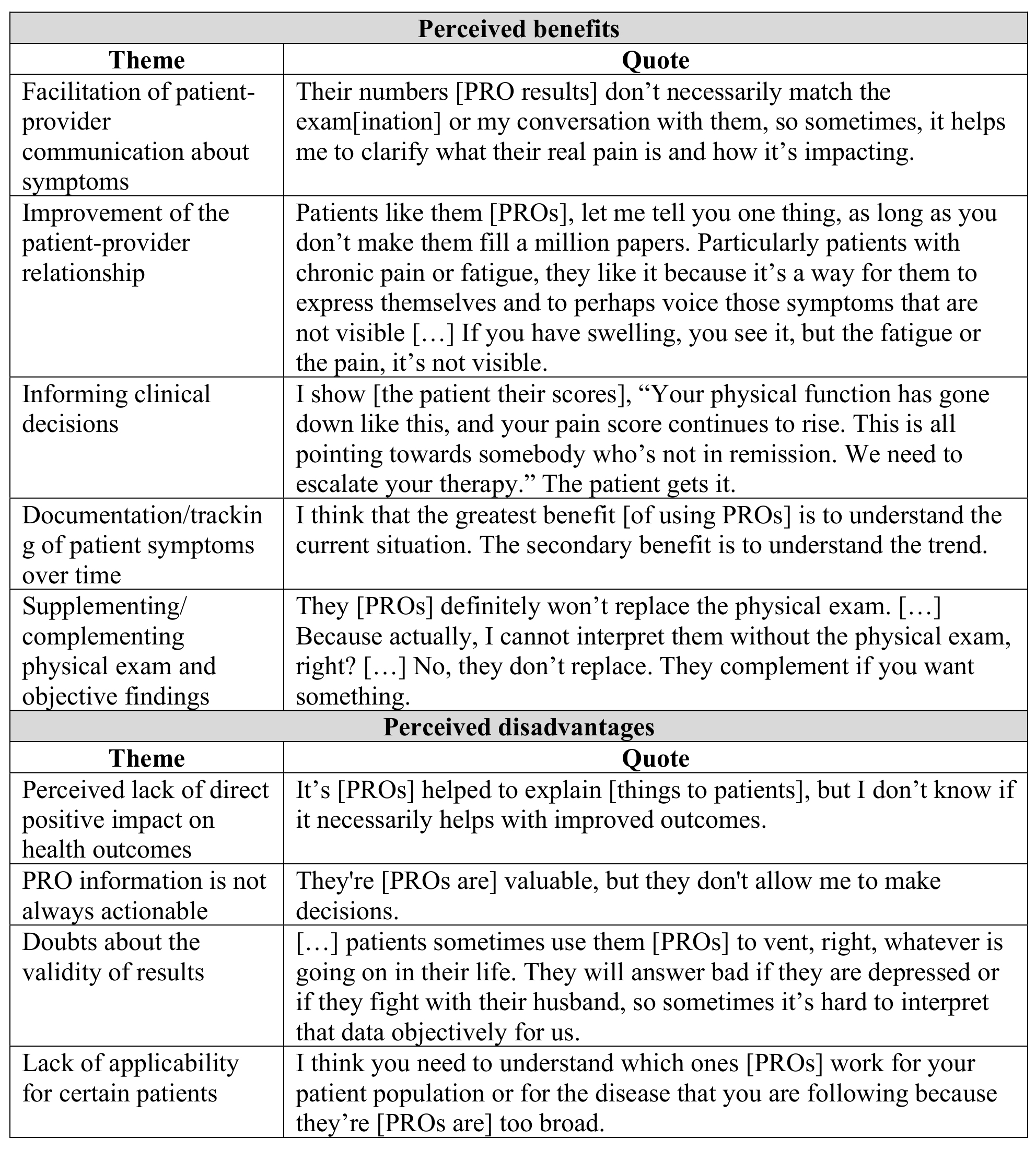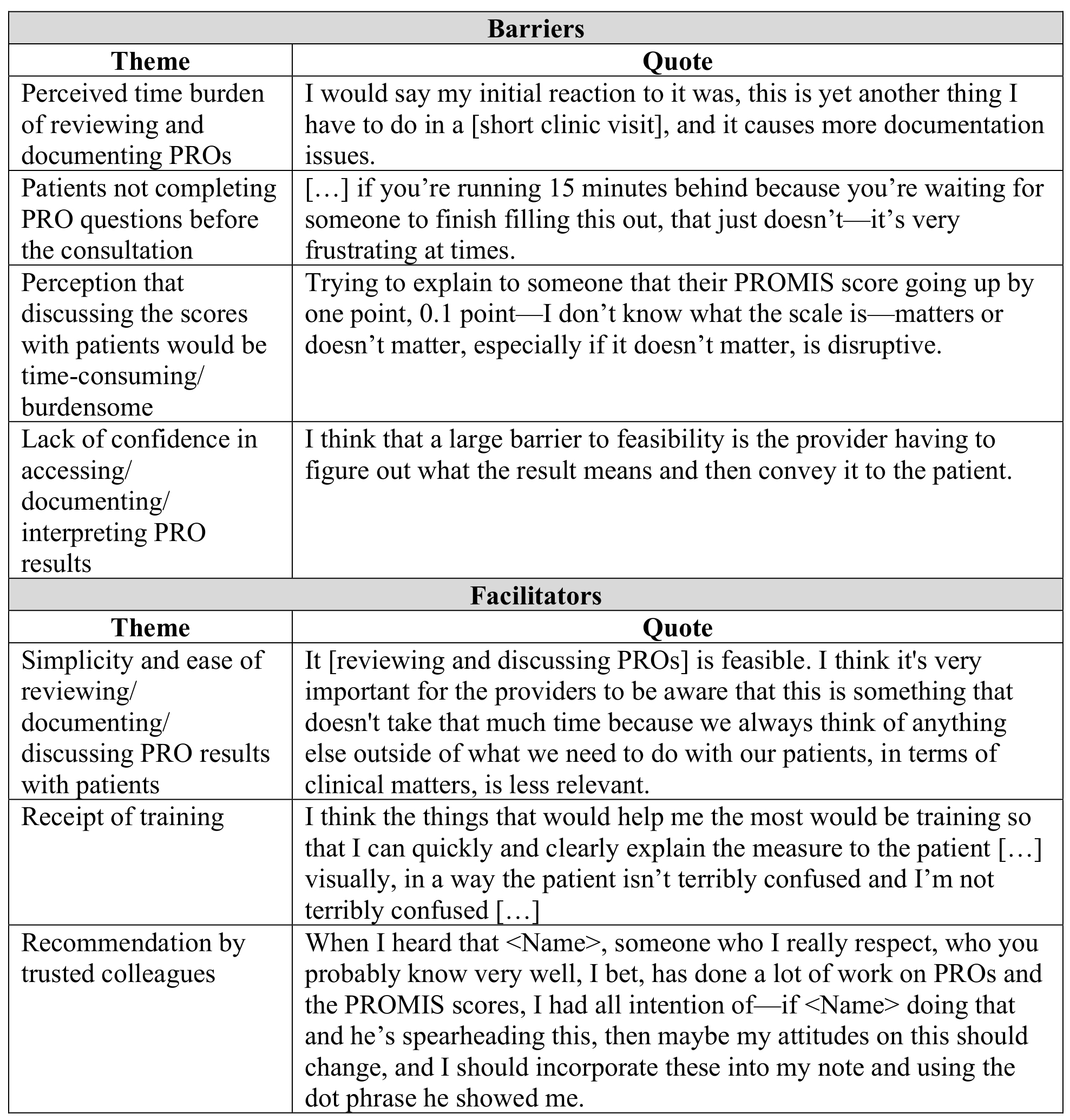Session Information
Date: Saturday, November 6, 2021
Title: Health Services Research Poster I: Lupus, Inflammatory Arthritis, & More (0128–0148)
Session Type: Poster Session A
Session Time: 8:30AM-10:30AM
Background/Purpose: Patient-reported outcomes (PROs) are surveys completed by patients to provide measurements of health, quality of life, symptoms, and functional status. PROs are useful for documenting changes in patient’s health status over time as well as facilitating patient-provider communication about symptoms. Despite the potential benefits for the management of rheumatic diseases, uptake of PROs among rheumatology health care providers has been limited. The authors have been developing methods to promote the integration of specific PROs (PROMIS® measures for pain intensity, physical function, and sleep disturbance) into rheumatology care at our institution. To inform our future efforts, we conducted a qualitative study to describe rheumatology provider attitudes towards the feasibility and acceptability of reviewing and discussing PROMIS or other PROs in rheumatology practice.
Methods: In-depth semi-structured interviews were conducted with health care providers at our institution, who were asked to discuss their experiences and attitudes towards the use of PROs in rheumatology care. We recruited providers who had received training on the use of PROMIS as part of a previous study led by 2 of the authors, as well as providers who had not participated in the previous study. The interviews were conducted via phone or video call and lasted between 30-120 minutes. Written informed consent was obtained from participants before the interviews. The interviews were audio recorded and transcribed for analysis.
Qualitative analysis of the transcripts was conducted using NVivo software. Five of the authors carried out the analysis. We used a combination of inductive and deductive coding. Each transcript was coded independently by at least 2 team members, who met to discuss and reconcile any discrepancies in coding that were >=20% for individual codes. The resulting coded data was reviewed and summarized as themes to describe current uptake, perceived benefits and disadvantages, and perceived barriers and facilitators of using PROMIS/PROs.
Results: The 8 health care providers interviewed included 7 physicians and 1 advanced nurse practitioner; 6 of these currently used PROMIS or other PROs in clinical care (Table 1). Two of the providers were trained in the use of PROMIS as part of our previous study—these providers still used PROMIS in clinical care for their patients. Unexpectedly, two other providers (1 physician and 1 advanced nurse practitioner) reported routinely using PROMIS in clinical care, although they had not participated in the previous study.
The perceived benefits/disadvantages and barriers/facilitators of using PROs in rheumatology care identified by interviewees are summarized in Tables 2-3.
Conclusion: Rheumatology health care providers had a range of attitudes towards the use of PROMIS/PROs in clinical practice and addressing their concerns will be important for promoting the use of PROMIS and other PROs. Demonstrating the value and ease of using PROs in clinical care is essential for gaining support from health care providers.
Acknowledgements:
This study was supported by funding from NIAMS and NIH (T32AR07080 and K24AR063120).
To cite this abstract in AMA style:
Shaw Y, Kortam N, Chalak A, Li Y, Reger F, Nagaraja V, Khanna D. Rheumatology Provider Perspectives on Using Patient-Reported Outcomes in Clinical Care [abstract]. Arthritis Rheumatol. 2021; 73 (suppl 9). https://acrabstracts.org/abstract/rheumatology-provider-perspectives-on-using-patient-reported-outcomes-in-clinical-care/. Accessed .« Back to ACR Convergence 2021
ACR Meeting Abstracts - https://acrabstracts.org/abstract/rheumatology-provider-perspectives-on-using-patient-reported-outcomes-in-clinical-care/



